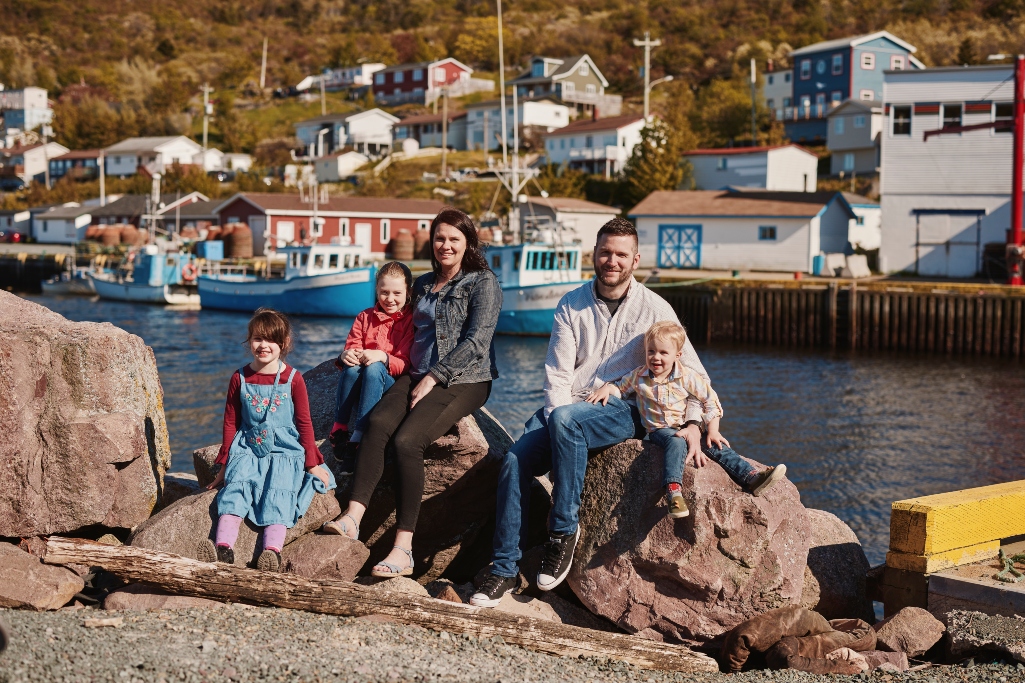
Matt Lahey and his wife, Ruth, moved to Newfoundland after experiencing a burden to plant a gospel-preaching church in St. John’s, where few evangelical churches have ever existed. In their neighborhood of Kilbride, there had not been a church service of any kind since the last church burned down in 1892.
ST. JOHN’S, Newfoundland — Spend a little time looking at aerial images of Newfoundland and its nickname — “The Rock” — won’t surprise you.
An island off Canada’s Atlantic Coast, Newfoundland’s strikingly beautiful coastlines surround a large 43,000-square-foot “rock” that is home to some of the oldest and least populated regions of the country.
“It didn’t get that nickname just because of its rugged coastline. Newfoundland is called ‘The Rock’ because here, life is hard—especially when you’re starting a church,” said church planting missionary Matt Lahey.
The eastern-most point of North America, the harshness of the land and water, which has often made life difficult, defined the culture for a millennium.
When Lahey and his team hosted the first worship service of Kilbride Community Church, it was the first church service in the neighborhood since a local Roman Catholic Church burned down in 1892. While there are other churches scattered throughout the greater St. John’s area, very few are evangelical.
“We’re trying to lay foundations, but it’s hard to establish anything in rock,” Lahey said. “So, when we talk about church planting, we first need to undo misconceptions about what the church is. We have to live differently because everyone would call themselves a Christian here, but they have no idea what the gospel means. And so, we have to show people not only what it means to do church, but also what it means to be the hands and feet of Christ.”
With deep roots in Newfoundland, Lahey understands those prevailing spiritual dynamics because he has lived them. He came to faith in Christ as a nearly 21-year-old, but there were no evangelical churches to disciple him. Over the next two years, God used a copy of the Good News Bible and other Christian resources he could find online to help him grow in his faith.
But Lahey had to move halfway across the earth for God to call him back to start a church in the deeply unchurched part of Newfoundland where he grew up.
After Lahey married Ruth, the couple moved to Australia where she was from. His mom visited shortly after their second child was born. Previously resistant to the gospel, his mother and her boyfriend attended church all four weeks they were in town. The night before she left, his mom noted she felt like the church’s pastor was preaching directly to her.
As his mom told him this, Lahey’s heart was breaking. He had prayed for her salvation for more than a decade.
“I know she’s going back to the same place where I came to faith, this place where the gospel is not preached,” Lahey said. “There’s no church, there’s no body of believers, at least for an hour’s drive north.”
Lahey realized his mom was one of thousands of people living along the Southern Shore with no access to the good news about Jesus. God used that experience to plant a call in Lahey’s life to start a church in Newfoundland.
Lahey and his family moved back to Canada and joined Calvary Baptist Church in St. John’s, a Canadian National Baptist Convention church. The church had just recently started Mile One Mission, an organization committed to planting gospel-centered, Christ-exalting churches in Newfoundland and Labrador. With Calvary Baptist’s partnership, Lahey and his family moved to the St. John’s neighborhood of Kilbride to begin planting the church.
But the process has been difficult. In 2019, Lahey hosted a 10-week Bible study and only one person showed up. Today, 15 people meet on Sunday nights for a small group. Except for one couple, all of them come from the Kilbride neighborhood.
“It’s beautiful,” Lahey said. “We gather, we share meals, we pray with each other, do Bible studies. We do book studies. You got to understand, these are extremely raw Christians. There’s a lot of the basics happening. There’s just a lot of modeling what it means to be a Christian.”
Lahey realizes that building a self-sustaining church of 50 to 75 people will take time. He expects it will take five to 10 years to get from conception to that size of congregation because their work is really best described as frontier missions.
Newfoundlanders typically look at outsiders with suspicion, so having roots in the area helps. But, every Sunday when the church gathers, he said, Lahey is reminded how outnumbered believers are in the province.
“That’s why knowing we’re not alone is so important,” Lahey said. “Churches from all over who pray for us and give to the Annie Armstrong Easter Offering®—that’s a big part of what keeps us going.”
Lahey is looking beyond the neighborhood of Kilbride. Through the church’s partnership with Calvary Baptist and Mile One Mission, he’d like to see the church catalyze a movement throughout the Southern Shore region of the province.
“We believe that the truth of the gospel is the light they need to see the way,” Lahey said. “We see hopelessness and helplessness everywhere we turn—whether people are struggling with substance abuse, alcoholism, the breakdown of the family or simply being stuck in deep religious traditions, the gospel is the answer… even if they don’t realize it yet.”
(EDITOR’S NOTE – Tobin Perry writes for the North American Mission Board. The Annie Armstrong Easter Offering provides half of NAMB’s annual budget, and 100% of the proceeds go to the field. The offering is used for training, support and care for missionaries, and for evangelism resources. This year’s week of prayer for the offering is March 5-12.)


